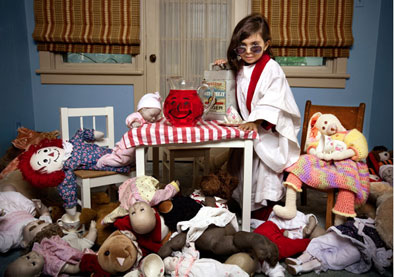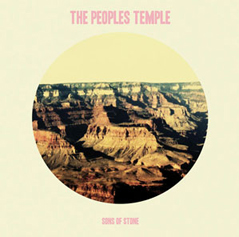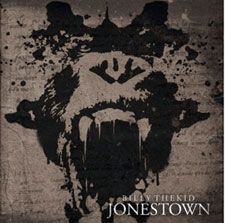
In addition to the stories by artists, composers and filmmakers in this section of the jonestown report, we learned of these other developments within the past year:
• A BBC 4 radio dramatization of some of the correspondence taken from Rebecca Moore’s book, The Jonestown Letters, which aired in January 2010, was nominated a year later for a Sony, the highest award in British radio broadcasting.
A fuller description of the program appears as the second item in last year’s Arts and Popular Culture Notes.
• Brian Kevin’s essay “Songs Primarily in the Key of Life,” on the Peoples Temple record album He’s Able, was selected as one of the year’s Notable Essays in Best American Essays 2011, published in early October. The piece was originally published last summer in Colorado Review . Brian’s reflections on his work with the material is here.
• The Untitled Marshall Kilduff Project – an independent film project by Jeff Keilholtz formerly entitled American Prophet – continues its search for a buyer. One major talent and production agency and several high profile independent executive producers have expressed interest in the project, although finalizing all financial needs to get the film off of the ground are not yet solidified.
As Keilholtz wrote in an earlier edition of the jonestown report, he decided he didn’t want his film to try to tackle the entirety of the Peoples Temple story. “My ambition, I decided, was to find an alternative perspective, a voice of truth contrary to typical design. I quickly determined my subject to be the reporter who brought Peoples Temple to light.”
• One slang phrase used in the business world – which has not quite reached the familiarity or spillover into other aspects of life as has “drinking the Kool-Aid” – is “the Jonestown defense,” defined as “harming one’s own company or even committing corporate suicide in order to avoid being taken over by a hostile predator.” It is also the name of an independent film released early this year. Reviews of the film appear here and here.
In addition, as noted in an article in last year’s edition of the jonestown report, the word “Jonestown” has acquired several new meanings in American slang. One of the sources for slang, Urban Dictionary, has added a new definition for (lower case) “jonestown” within the last year: “The mythical place people say they are when they are in need of a fix.”.
• Jonathan Hobin, a Canadian photographer whose most recent work considers the effect of media upon children, has included an image entitled “White Nights” of a child standing in for Jim Jones overseeing the deaths of his followers – in this case, the child’s toys – in his exhibition In The Playroom at the Dale Smith Gallery in Ottawa. An interview with Hobin on CNN appears here.
• Jim Jones was transformed into Reverend Sammy Smith – better known as The Rev – the leader of the Church of the Saved, in the Marvel Comic The Punisher, according to the Comic Book Religion website. First appearing in November 1987, the villain appeared in eight editions of the comic. A total of nine leaders and members of the Church of the Saved appeared in the series altogether.
A number of musical artists and groups have incorporated the icons – and even the very name – of Jonestown into their own images in recent months. Among recent discoveries:
• Jem Warren, a New York-based singer-songwriter, has a new album Lifeblood to My Soul, one track of which – “Jim Jones” – beat out 1600 other submissions to win the “Confession Song Competition” for a new Hulu.com web series called The Confession.
“Warren wrote the song Jim Jones while watching the PBS American Experience documentary Jonestown: The Life and Death of Peoples Temple,” according to an interview on (the now-defunct) Fanity website. “So powerfully moved by what he was watching, Warren felt inspired to write about it. ‘I came up with the guitar rip for the song while watching the documentary. I tend to have the TV on in the background while writing music. The song is really about the dangers of blind faith; of going into something without asking the right questions.’” The song on Apple Music appears here.
• Jonestown is the name of a self-described “Hardcore Punk troubador” band. Its music video “Paper Pills” debuted in July 2011. A second video, “Outlaw Vagabond” was uploaded on YouTube in June.
• Jonestown is also the name of an electronic music artist whose song “Sweet Thang” is here.
 • The Peoples Temple – a self-described Rock / R&B / Soul / Sixties / Surf / Garage / Punk band from Lansing, Michigan – has released its Sons of Stone album, which Metrotimes, a Detroit-based music publication, describes as “endearing and charming… [that] has been getting some hefty attention worldwide.” The review of the album in The L.A. Times praised the effort, but noted that “a band named after Jim Jones’ suicidal 1970s cult can’t help but possess a cynical side.”
• The Peoples Temple – a self-described Rock / R&B / Soul / Sixties / Surf / Garage / Punk band from Lansing, Michigan – has released its Sons of Stone album, which Metrotimes, a Detroit-based music publication, describes as “endearing and charming… [that] has been getting some hefty attention worldwide.” The review of the album in The L.A. Times praised the effort, but noted that “a band named after Jim Jones’ suicidal 1970s cult can’t help but possess a cynical side.”
• D-Sisive, a rapper who released the album Jonestown in 2009, returned this year with a follow-up effort, Jonestown 2: Jimmy Go Bye Bye. Reviews of the album appear here and here. As was the case with the first album, the music from the second is available for free here.
• A collection of experimental music by a group named The Peoples Temple Youth Group has several music videos, including “Pictures of Peoples Taking Pictures,” “pre-post modern” and “The Slavery of Love.”
 • An artist known as Broadcast Bandolier has released a short nine-track album of electronic instrumental music entitled The People’s Temple Agricultural Project which is available online free of charge. Song titles are taken from the death tape, including “We’re Ready to Go,” “It’s Too Late for Russia,” “Shoot the Pilot,” and “Let’s Die in Peace.”
• An artist known as Broadcast Bandolier has released a short nine-track album of electronic instrumental music entitled The People’s Temple Agricultural Project which is available online free of charge. Song titles are taken from the death tape, including “We’re Ready to Go,” “It’s Too Late for Russia,” “Shoot the Pilot,” and “Let’s Die in Peace.”
• Hardcore Costa Rican group Billy the Kid released its album Jonestown at the end of 2010. In addition to Jim Jones, the listings include tracks named after such well known mass murderers and serial killers as Timothy McVeigh, Ed Gein, the Unabomber, Ted Bundy, and the “Davidians,” but according to the band, the Jonestown tragedy had a special meaning for them in coming up with the concept for the work.
• Electronic artist Supreme Selecta sampled the Jonestown death tape in his original mix of “Camp Jonestown.”